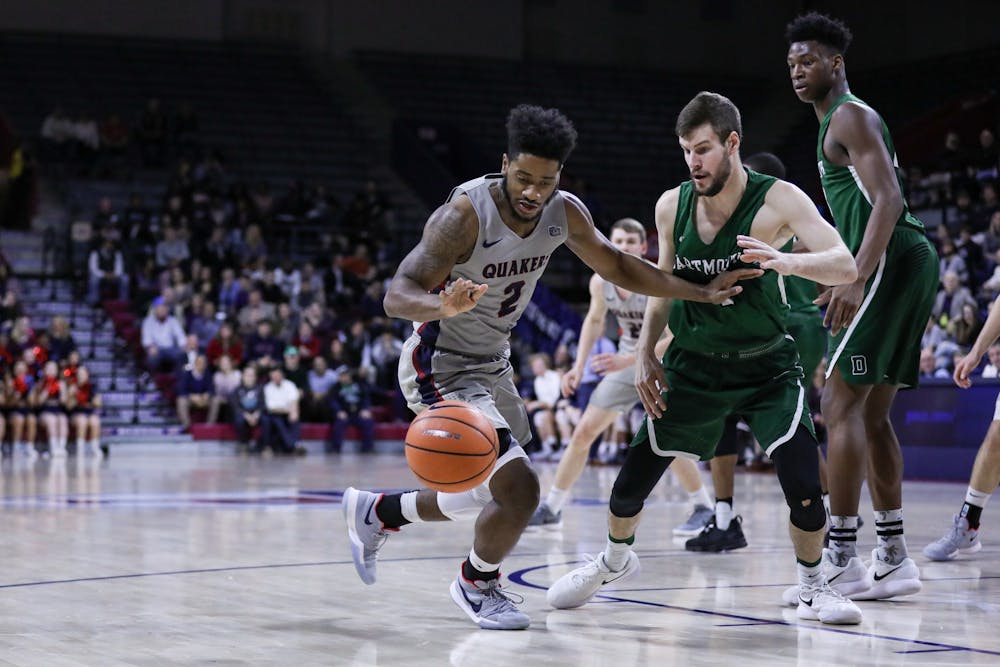
Penn Men's Basketball's greatest winning record in the Ivy League Conference is against Dartmouth, with Penn winning about 80% of the games.
Credit: Nicole FridlingThe Ivy League didn’t participate in conference play this past season, but in years past, Penn men's basketball has held their own against fellow members of the Ancient Eight.
Since the 1949-50 season, the Quakers have winning records against six of the seven other Ivy League teams, with the disparities being fairly lopsided. Below is a breakdown of Penn's all-time matchups with each of the other Ivy League schools, ranked from highest winning percentage for Penn to lowest.
Dartmouth — 113-29 (.796)
The Quakers’ most lopsided Ivy League record comes against the Big Green, with Penn winning roughly 80% of their games against them. Despite losing the most recent game in the series in February 2020, the recent Quakers teams have won five of the last six against Dartmouth. This matchup also has the highest average scoring disparity, with the cumulative game average being +10.5 for Penn. The longest winning streak of the series came toward the early days of the matchup, as Penn won 30 straight games against Dartmouth from 1968 to 1983.
Brown — 106-28 (.791)
In 134 games against the Bears, the Quakers have won just over 79% of them. Since February 2017, Penn has won six of the last seven against Brown, with the one loss coming roughly a year ago in a double-digit thumping. The longest winning streak of the series came in the 1990s and early 2000s. The Quakers won 19 straight games against the Bears in this stretch — almost all of the wins came by double digits.
Harvard — 108-36 (.750)
After 144 games against the Crimson, Penn has managed to win exactly 75% of them, with most victories coming earlier on in the all-time series. In the 2010s, the Quakers had an overall losing record against Harvard. This was due in large part to an improved Harvard men’s basketball program, as the school advanced to the NCAA Tournament four times during the 2010s. The most dominant stretch for Penn was from 1949 to 1984, as the Quakers went 62-8 during this period.
Cornell — 101-41 (.711)
In 142 games against the Big Red, the Quakers have won roughly 71% of them. Many of these wins have come recently, given that Penn has won 14 of their last 15 games against Cornell. The average score between Penn and Cornell is 72.6-64.8 in favor of the Quakers, giving them about an eight-point margin of victory. The longest streak by either team in the all-time series belongs to Penn, who won 18 straight games from 1999 to 2007.
Columbia — 101-42 (.706)
Against the Lions, the Quakers have played 143 total games, winning roughly 70% of them. Penn has won five of the last six games in the series, with the majority of the 2010s being marked by a consistent wins for the Quakers. Penn has scored 9,893 all-time points in the series, while Columbia has scored 8,951 points. The longest winning streak of the series is a tie between stretches from 1993 to 2001 and 1970 to 1978, each of which contained 17 straight Penn wins.
Yale — 96-48 (.667)
After 144 contests, Penn has secured victories in exactly two-thirds of their games against the Bulldogs. Among the opponents in the Ivy League that Penn has a winning record over, Yale is the team the Quakers have the lowest percentage of wins against. This is due in large part to a turbulent 2010s, as Penn lost nine straight games to Yale from 2013 to 2017. Despite the recent woes, Penn has, for the most part, been dominant over Yale. Earlier decades were marked by several Penn winning streaks, with the longest streak by either team coming from 1968 to 1976, as the Quakers won 16 straight games.
Princeton — 66-80 (.452)
Out of the seven Ivy League teams Penn faces, Princeton is the only school that they have a losing record against. In 146 games, the Quakers have posted a winning percentage of roughly 45%. The average point differential is razor-thin, as Penn gets defeated by an average of -0.8 points. Penn's losing record comes in large part due to their recent play. In the last 24 games, Princeton has won 20 of them, many of which were double-digit blowouts.
The Daily Pennsylvanian is an independent, student-run newspaper. Please consider making a donation to support the coverage that shapes the University. Your generosity ensures a future of strong journalism at Penn.
Donate




